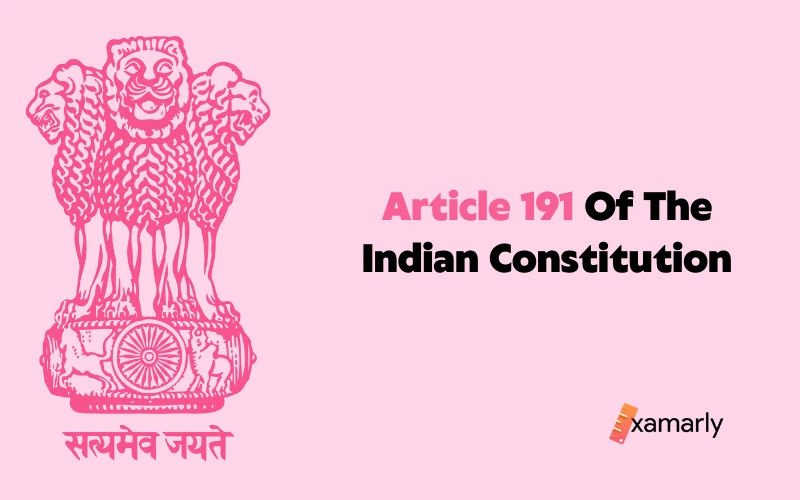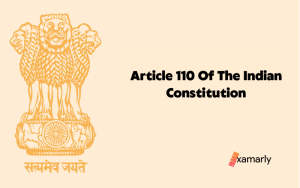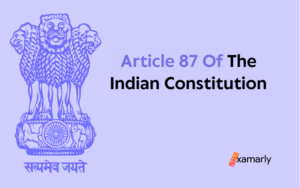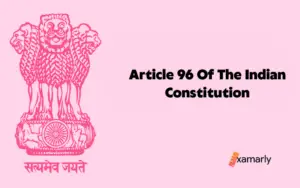Have you ever wondered about the criteria for disqualification from either of the Houses of the Legislature of a State? This article holds the answer to this question.
Article 191 of the Indian Constitution talks about the disqualification of members from their seat in the State Legislative Assembly as well as the State Legislative Council. It lists down the conditions when a member is not eligible to be chosen as a member or barred from being a member of either of the Houses of the Legislature of a State.
Give a patient reading to Article 191, acquaint yourself with the information contained and speed up your UPSC preparation with the help of this detailed article.
- Article 191 Of The Indian Constitution: Disqualification Of Members
- Clause (1) Of Article 191 Of The Indian Constitution: Explained
- Clause (2) Of Article 191 Of The Indian Constitution: Explained
- Amendment It Is Related To
- Summing Up
- FAQs Related To Article 191
- What Is Understood By Office Of Profit?
- Which Other Article Of The Indian Constitution Provides Provisions For The Disqualification Of Membership Specifically From The House Of Parliament?
- How Many Clauses And Sub-clauses Are There In Article 191 Of The Indian Constitution?
- What Was The Draft Article For Article 191 Of The Indian Constitution?
- When Was Draft Article 167 Debated And Adopted Into The Indian Constitution?
- Which Constitutional Amendment Act Contains Provisions For Decision On Questions Such As The Disqualification Of The Members Of Parliament?
- Who Has The Authority To Decide What Constitutes The Office Of Profit?
- Which Article Of The Indian Constitution Forbids An MLA Or An MLC From Holding Any Office Of Profit Under The Central Government Or The State Government?
Article 191 Of The Indian Constitution: Disqualification Of Members
To begin with, let us take a look at what does the document of the Constitution of India hold as the official text of Article 191 of the Indian Constitution. This article takes into account the disqualification of members of the Houses of the Legislature of a State.
Article 191 is constituted by two clauses, out of which the first clause is further divided into several sub-clauses. Let us take up each clause individually and examine them closely to derive its meaning and purpose.
Clause (1) Of Article 191 Of The Indian Constitution: Explained
Quoted from the Constitution of India, the following text serves as the first clause of Article 191. It reads as follows:
” (1) A person shall be disqualified for being chosen as, and for being, a member of the Legislative Assembly or Legislative Council of a State—
[(a) if he holds any office of profit under the Government of India or the Government of any State specified in the First Schedule, other than an office declared by the Legislature of the State by law not to disqualify its holder;]
(b) if he is of unsound mind and stands so declared by a competent court;
(c) if he is an undischarged insolvent;
(d) if he is not a citizen of India, or has voluntarily acquired the citizenship of a foreign State, or is under any acknowledgment of allegiance or adherence to a foreign State;
(e) if he is so disqualified by or under any law made by Parliament. “
The first clause of Article 191 contains five sub-clauses under it. These sub-clauses list down the various reasons that could possibly entail the disqualification of membership and eventually, the loss of a seat from either of the Houses of the Legislature of a State.
Sub-clause (1) (a) says that if any individual serves as a member of any office of profit that falls under the Indian Government or any State Government that has been specified in the First Schedule of the Indian Constitution, then that individual is disqualified from being a member or even being chosen as a member of the State’s Legislative Assembly or Legislative Council. The sole reason is the fact that the individual is a Minister either for the Union or one of the States mentioned in the First Schedule of the Indian Constitution.
The exception to this sub-clause is the inability to disqualify the bearer of any office that has been declared by the Legislature of the State in accordance to the law.
Sub-clause (b) of the article presents the other condition that prohibits an individual from becoming a member or being chosen as a member of either of the Houses of the Legislature of a State is that if the individual is not of sound mind. This needs to be proclaimed as a matter of proof by any court that is competent in making such a claim.
Any person who is guilty of being an undischarged insolvent is not eligible to be a member of any of the Houses is stated by sub-clause (c) of Article 191. The person in question continues to be labelled as an undischarged insolvent up to the point at which the court does not discharge him. This means that the court needs to declare him free from his debts and liabilities for him to be a member or even chosen for being a member of the State Legislative Assembly or the State Legislative Council.
In addition to the above factors, sub-clause (d) explains that any person who does not hold an Indian citizenship shall not qualify to be a member of any of the Houses. Moreover, if any person possesses a foreign State citizenship or has declared his commitment to or allegiance to a foreign State in any way, has to give up the seat of either of the Houses of the Legislature of a State on the grounds of disqualification.
Lastly, we get to know through sub-clause (e) that any person shall lose the right for acquiring the membership of either of the Houses of the Legislature of a State if the Parliament decides so by or under any law of the country.
Clause (2) Of Article 191 Of The Indian Constitution: Explained
The second clause of the article reads as follows:
” (2) A person shall be disqualified for being a member of the Legislative Assembly or Legislative Council of a State if he is so disqualified under the Tenth Schedule. “
There are certain conditions contained in the Tenth Schedule of the Indian Constitution which basically are the provisions that are applicable in cases where disqualification on the grounds of defection hold true. If any of these conditions apply to any member or to-be member, then their right to obtain a seat in the State Legislative Assembly or the State Legislative Council is taken away following instances of defection.
Amendment It Is Related To
The Constitution (Fifty-second Amendment) Act, 1985, saw the amendment of Article 191. An explanation for the purpose of the clause by substituted by means of this amendment of the Indian Constitution.
In addition to that, the amendment also relegated the provisions offered by the Tenth Schedule to Article 102(2) and Article 191(2). These provisions were related to the disqualification of members on the basis of defection.
Summing Up
In summary, we can say that Article 191 of the Indian Constitution is the answer to the primary question of when are the members of any House of the Legislature of a State under the threat of being disqualified from their office.
With its provisions contained in two clauses and five sub-clauses, Article 191 takes into account the disqualification of membership or from being chosen as a member of either of the Houses of the Legislature of a State, that is, the State Legislative Assembly (Vidhan Sabha) or the State Legislative Council (Vidhan Parishad).
FAQs Related To Article 191
What Is Understood By Office Of Profit?
The ‘office of profit’ is a constitutional concept that arises if any Member of Parliament (MP), Member of Legislative Assembly (MLA) or Member of Legislative Council (MLC) hold any additional post which brings in some sort of benefit, advantages, financial gains, perks, etc. to the member other than what he receives from his existing office. So, if a member is holding two such offices, then the issue of ‘office of profit’ arises.
This concept became a part of the Indian Constitution under Articles 102(1)(a) and 191(1)(a).
Which Other Article Of The Indian Constitution Provides Provisions For The Disqualification Of Membership Specifically From The House Of Parliament?
Apart from Article 191, Article 102 (1) (a) of the Indian Constitution provides certain provisions that were framed for the purpose of disqualification of membership. This disqualification of membership is applicable for the members of the House of Parliament.
How Many Clauses And Sub-clauses Are There In Article 191 Of The Indian Constitution?
Article 191 of the Indian Constitution is made up of two clauses, namely- clause (1) and clause (2).
The first clause of this article has five sub-clauses, namely- sub-clauses (a), (b), (c), (d), and (e).
What Was The Draft Article For Article 191 Of The Indian Constitution?
Article 191 of the Indian Constitution was finalised from Draft Article 167.
When Was Draft Article 167 Debated And Adopted Into The Indian Constitution?
Draft Article 167 was debated in the Constituent Assembly and adopted into the Constitution of India on the same day. It was done on June 2, 1949.
Which Constitutional Amendment Act Contains Provisions For Decision On Questions Such As The Disqualification Of The Members Of Parliament?
The Constitution (Fifty-second Amendment) Act of the Indian Constitution provides for the disqualification of the Members of Parliament as well as the Members of the State Legislative Assembly (Vidhan Sabha) and the State Legislative Council (Vidhan Parishad). It takes into consideration the rising concern of political defections.
Who Has The Authority To Decide What Constitutes The Office Of Profit?
Under Article 102(1)(a) of the Indian Constitution, the Indian Parliament determines the office of profit for the Union Government. On the other hand, under Article 191(1)(a) of the Indian Constitution, the State Legislature determines the office of profit for the states.
Which Article Of The Indian Constitution Forbids An MLA Or An MLC From Holding Any Office Of Profit Under The Central Government Or The State Government?
Articles 102(1)(a) and 191(1)(a) Of the Indian Constitution forbid a Member of the Legislative Assembly (MLA) or a Member of a Legislative Council (MLC) from holding any office of profit under the Central Government or the State Government.






